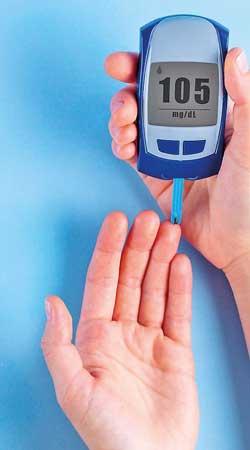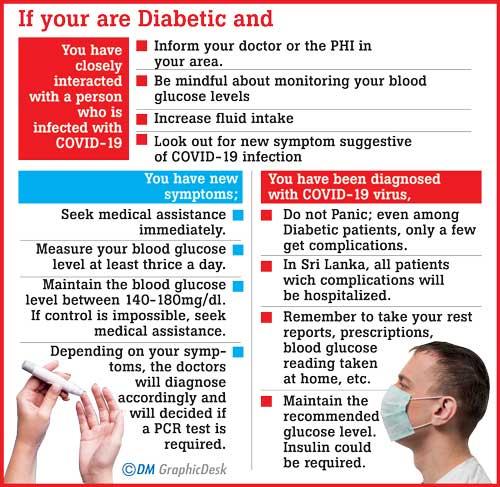
Being Diabetic alone does not necessarily mean that one is more likely to get infected with COVID-19. Everyone is exposed to an equal risk of getting infected. However, the likelihood of adverse outcomes after being infected is increased in persons with Diabetes, compared to a healthy individual due to the immunocompromising nature of Diabetes Mellitus.
What does it mean to be Immunocompromised?
Our bodies have an internal security network called the Immune system. When a pathogen or an unidentified particle enters the body, it is perceived as a threat, and a triggered Immune system fights off the offending agent.
Patients with uncontrolled Diabetes are considered immunosuppressed due to the effects of elevated blood sugar on the immune system. If the pathogen can invade the host while the immune system is weak, there is an increased risk of severe disease. Poorly controlled diabetes also impairs the white cell action.

High blood sugar over a long period (chronic hyperglycemia) slows down the perfusion of oxygen and other nutrients through blood vessels, causing nerve damage and damage to other vital organs as time progresses. Skin, the first barrier itself is no longer competent due to poor perfusion and associated nerve damage. Due to the nerve damage, patients would not be able to identify sensations of pain and temperature, especially in the feet, and wounds go unnoticed, therefore, untreated, and becomes a breeding ground for infections. Soft-tissue infections are prominent in uncontrolled Diabetes, and may even lead to amputation of limbs. Prompt and general foot care is vital in Diabetic foot ulcers. Diabetics become prone to Urinary Tract Infections as well, due to glycosuria and decreased immunity.
Diabetes and COVID-19
According to the CDC (Center for Disease Control and Prevention), adults of any age with the following conditions are at increased risk of severe illness from the virus that causes COVID-19:
- Cancer

- Chronic kidney disease
- COPD (Chronic Obstructive Pulmonary Disease)
- Heart conditions (Eg. heart failure, coronary artery disease)
- Immunocompromised state from organ transplant
- Severe Obesity (BMI ≥ 40 kg/m2)
- Pregnancy
- Sickle cell disease
- Smoking
- Type 2 Diabetes Mellitus
Dr. Manilka Sumanatilleke, Consultant Endocrinologist and the President of the Sri Lanka Diabetes Federation, shared some insight on preventive measures and lifestyle advice for individuals with Diabetes.
If you are a Diabetic and
You have closely interacted with a person who is infected with
COVID-19:
- Inform your doctor or the PHI in your area.
- Be mindful about monitoring your blood glucose levels
- Increase fluid intake
- Look out for new symptoms suggestive of Covid-19 infection)
- You have new symptoms:
- Seek medical assistance immediately.
- Measure your blood glucose level at least thrice a day.
- Maintain the blood glucose level between 140-180mg/dl. If control is impossible, seek medical assistance.

Depending on your symptoms, the doctors will diagnose accordingly and will decide if a PCR test is required.
You have been diagnosed with the Covid-19 virus,
Do not Panic; even amongst Diabetic patients, only a few get complications.
In Sri Lanka, all patients with complications will be hospitalized. Remember to take your test reports, prescriptions, blood glucose readings taken at home, etc.
Maintain the recommended glucose level. Insulin could be required.
General advice for Diabetes patients during a pandemic:
Continue taking your diabetes medication/Insulin as usual, as well as your blood pressure medicines including Enalapril,Peridopril, Losartan etc. Cholesterol medications also should be continued.
Preventing diabetic complications involves proper glycemic control. The Standard of care includes maintaining HbA1c < 7%, blood pressure <130/80 mmHg, and control of cholesterol levels. Patients with high risk feet( with neuropathy) should also inspect their feet daily.
Adherence to the previously mentioned tips benefits both the patient and doctor, prevention is always
the key.
 Being Diabetic alone does not necessarily mean that one is more likely to get infected with COVID-19. Everyone is exposed to an equal risk of getting infected. However, the likelihood of adverse outcomes after being infected is increased in persons with Diabetes, compared to a healthy individual due to the immunocompromising nature of Diabetes Mellitus.
Being Diabetic alone does not necessarily mean that one is more likely to get infected with COVID-19. Everyone is exposed to an equal risk of getting infected. However, the likelihood of adverse outcomes after being infected is increased in persons with Diabetes, compared to a healthy individual due to the immunocompromising nature of Diabetes Mellitus.

 Depending on your symptoms, the doctors will diagnose accordingly and will decide if a PCR test is required.
Depending on your symptoms, the doctors will diagnose accordingly and will decide if a PCR test is required.